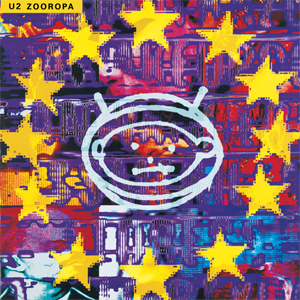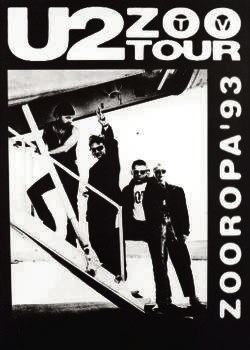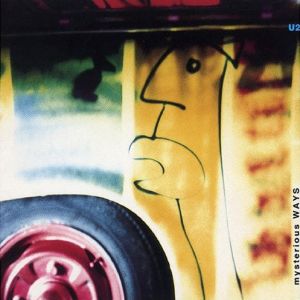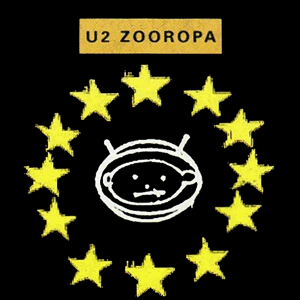Related Research Articles

U2 are an Irish rock band formed in Dublin in 1976. The group consists of Bono, the Edge, Adam Clayton, and Larry Mullen Jr.. Initially rooted in post-punk, U2's musical style has evolved throughout their career, yet has maintained an anthemic quality built on Bono's expressive vocals and the Edge's chiming, effects-based guitar sounds. Bono's lyrics, often embellished with spiritual imagery, focus on personal and sociopolitical themes. Popular for their live performances, the group have staged several elaborate tours over their career.

Achtung Baby is the seventh studio album by Irish rock band U2. It was produced by Daniel Lanois and Brian Eno, and was released on 18 November 1991 on Island Records. After criticism of their 1988 release Rattle and Hum, U2 shifted their direction to incorporate influences from alternative rock, industrial music, and electronic dance music into their sound. Thematically, Achtung Baby is darker, more introspective, and at times more flippant than their previous work. The album and the subsequent multimedia-intensive Zoo TV Tour were central to the group's 1990s reinvention, by which they abandoned their earnest public image for a more lighthearted and self-deprecating one.

Zooropa is the eighth studio album by Irish rock band U2. Produced by Flood, Brian Eno, and the Edge, it was released on 5 July 1993 on Island Records. Inspired by the band's experiences on the Zoo TV Tour, Zooropa expanded on many of the tour's themes of technology and media oversaturation. The record was a continuation of the group's experimentation with alternative rock, electronic dance music, and electronic sound effects that began with their previous album, Achtung Baby, in 1991.

Melon: Remixes for Propaganda is a compilation of remixes released by Irish rock band U2 exclusively to members of the band's magazine/fan club, Propaganda, in spring 1995. Some of the remixes were previously available on singles and some have been re-released on later singles and compilations, while some remain exclusive to this set. The title "Melon" is an anagram of "Lemon", which is a reference to U2's song of the same name that appears on two tracks of the album.

The Zoo TV Tour was a worldwide concert tour by rock band U2. Staged in support of their 1991 album Achtung Baby, the tour visited arenas and stadiums from 1992 to 1993. It was intended to mirror the group's new musical direction on Achtung Baby. In contrast to U2's austere stage setups from previous tours, the Zoo TV Tour was an elaborately staged multimedia spectacle, satirising television and media oversaturation by attempting to instill "sensory overload" in its audience. To escape their reputation for being earnest and over-serious, U2 embraced a more lighthearted and self-deprecating image on tour. Zoo TV and Achtung Baby were central to the group's 1990s reinvention.

"City of Blinding Lights" is a song by Irish rock band U2. It is the fifth track on their eleventh studio album, How to Dismantle an Atomic Bomb (2004), and was released as the album's fourth single on 6 June 2005. It was produced by Flood, with additional production by Chris Thomas and Jacknife Lee. The song reached number one in Spain, and peaked in the top ten in Canada, Ireland, the United Kingdom, and several other countries. The music video was shot at the General Motors Place in Vancouver, British Columbia, Canada.

"Hold Me, Thrill Me, Kiss Me, Kill Me" is a song by Irish rock band U2. It was released as a single from the soundtrack album for the film Batman Forever on 5 June 1995 by Atlantic and Island. A number-one single in their home country of Ireland, as well as in seven other countries, it reached number two on the UK Singles Chart, number sixteen on the US Billboard Hot 100, and number one on the Billboard Album Rock Tracks and Modern Rock Tracks charts. The song received Grammy Award nominations for Best Rock Performance by a Duo or Group with Vocal and Best Rock Song. The song is included on the compilation album The Best of 1990–2000 and the live album From the Ground Up: Edge's Picks from U2360°. Its music video was directed by Kevin Godley and Maurice Linnane.

"Lemon" is a song by Irish rock band U2. It is the fourth track on their eighth album, Zooropa (1993), and was released as its second single in September 1993 by Island Records. Inspired by old video footage of lead vocalist Bono's late mother, the lyrics describe an attempt to preserve memory through film. More than any previous U2 song, "Lemon" showcases Bono's falsetto vocal range, aided by atmospheric backing vocals from the Edge and Brian Eno. Mark Neale directed the accompanying music video. At almost seven minutes, it is among the band's longest songs.

"Numb" is a song by Irish rock band U2. It is the third track from their eight album, Zooropa (1993), and was released in June 1993 by Island Records and PolyGram as the album's first single. The song features a monotonous mantra of "don't" commands spoken by guitarist the Edge amidst a backdrop of various sound effects and samples. The noisy composition and lyrical concept for "Numb" were inspired by the theme of sensory overload, which had prominently been incorporated into the Zoo TV Tour. Lead singer Bono and drummer Larry Mullen Jr. provided backing vocals on the track.

"Mysterious Ways" is a song by Irish rock band U2. It is the eighth track from their 1991 album, Achtung Baby, and was released as the album's second single on 2 December 1991. The song began as an improvisation called "Sick Puppy", with the band liking only the bass part that bassist Adam Clayton composed. The band struggled to build a song from it, with vocalist Bono and producer Daniel Lanois arguing intensely during one songwriting session. The song's breakthrough came after guitarist the Edge began experimenting with the Korg A3 effects unit. "Mysterious Ways" features a danceable beat, funky guitar hook, and conga-laden percussion, as well as mystical lyrics by Bono about romance and women.

"The Fly" is a song by Irish rock band U2. It is the seventh track from their 1991 album, Achtung Baby, and it was released as the album's first single on 21 October 1991 by Island Records. "The Fly" introduced a more abrasive-sounding U2, as the song featured danceable hip-hop beats, industrial textures, distorted vocals, and an elaborate guitar solo. Lead vocalist Bono described the song as "the sound of four men chopping down The Joshua Tree", due to its departure from the sound that had traditionally characterised the band in the 1980s.

Zoo TV: Live from Sydney is a concert film by Irish rock band U2. It was shot on 27 November 1993 at Sydney Football Stadium in Sydney, Australia, during the "Zoomerang" leg of the group's Zoo TV Tour. Directed by David Mallet, the concert was broadcast on television worldwide via pay-per-view, and was released on home video in May 1994 on VHS and Laserdisc.
"Zoo Station" is a song by Irish rock band U2. It is the opening track from their 1991 album Achtung Baby, a record on which the group reinvented themselves musically by incorporating influences from alternative rock, industrial, and electronic dance music. As the album's opening track, "Zoo Station" introduces the band's new sound, delivering industrial-influenced percussion and several layers of distorted guitars and vocals. Similarly, the lyrics suggest the group's new intents and anticipations. The introduction, featuring an "explosion" of percussion and a descending glissando for a guitar hook, was meant to make the listener think the album was mistakenly not U2's latest record or that their music player was broken.
"Until the End of the World" is a song by rock band U2 and the fourth track from their 1991 album Achtung Baby. The song began as a guitar riff composed by lead vocalist Bono from a demo, which the band revisited with success after talking with German filmmaker Wim Wenders about providing music for his film Until the End of the World. The song's lyrics describe a fictional conversation between Jesus Christ and Judas Iscariot. The first verse discusses the Last Supper; the second is about Judas identifying Jesus with a kiss on the cheek in the Garden of Gethsemane; and the final is about Judas' suicide after being overwhelmed with guilt and sadness.

"Zooropa" is a song by Irish rock band U2, and is the opening track from their 1993 album of the same name. The song was the result of combining two pieces of music, the first of which was conceived in the studio, and the second of which was a soundcheck recording from one of the group's concert tours that was discovered by guitarist the Edge. The lyrics were written by lead vocalist Bono and describe two characters in a brightly lit city in a futuristic version of European society. Some lyrics in the song were taken directly from advertising slogans, and they also featured the phrase "dream out loud", which has appeared in other U2 media. The song touched on several themes, including moral confusion and the future of European society.
This is a timeline of the history of rock band U2:
"Acrobat" is a song by rock band U2, and is the eleventh track on their 1991 album Achtung Baby. The song developed from a riff created by guitarist the Edge, and is played in a 12
8 time signature. Lyrically, the song expresses themes of hypocrisy, alienation, and moral confusion. Although "Acrobat" was rehearsed prior to the third leg of the Zoo TV Tour, it had not been performed live until its debut on the Experience + Innocence Tour on 2 May 2018.

"Stay " is a song by Irish rock band U2. It is the fifth track on their eighth album, Zooropa (1993), and it was released as the album's third single on 22 November 1993 by Island Records. The song reached number one in Ireland and reached the top 10 in Australia, Iceland, the United Kingdom, and several other countries. The accompanying music video, directed by Wim Wenders, was shot in Berlin, Germany. The earliest incarnation of the song developed during sessions for the group's 1991 album Achtung Baby. It was written for and inspired by Frank Sinatra and bore his surname as the original working title. An alternative recording was used in the 1993 film Faraway, So Close!, also by Wim Wenders.
"Daddy's Gonna Pay for Your Crashed Car" is a song by Irish rock band U2 and the sixth track from their 1993 studio album Zooropa.

Songs of Surrender is an album of re-recorded songs by Irish rock band U2. Produced by guitarist the Edge, it was released on 17 March 2023 on Island Records and Interscope Records. Largely the effort of the Edge and lead vocalist Bono, the album comprises re-recorded and reinterpreted versions of 40 songs from the group's back catalogue, many in stripped-down and acoustic arrangements. The album is a companion to Bono's memoir, Surrender: 40 Songs, One Story (2022), which was structured into 40 chapters titled after U2 songs. Rearranged versions of the songs were first included in the audiobook edition of the memoir, and were performed by Bono during the book's promotional tour.
References
- ↑ Kaufman, Gil (11 January 2023). "U2 to Revisit 40 Classic Tracks on 'Songs of Surrender' Collection". Billboard. Retrieved 26 January 2023.
- ↑ "U2 - "Dirty Day" sheet music". Musicroom. Retrieved 26 January 2023.
- ↑ Tingen, Paul (March 1994). "Robbie Adams: Recording U2's Achtung Baby & Zooropa". Sound on Sound. Retrieved 26 January 2023.
- 1 2 McCormick (2006), p. 249.
- ↑ Banas, Erica (18 November 2022). "U2: Their 50 Best Songs, Ranked". 93.3 WMMR Rocks!. Retrieved 21 February 2023.
- ↑ Leas, Ryan (3 July 2013). "Zooropa Turns 20". Stereogum. Retrieved 26 January 2023.
- 1 2 Whatley, Jack (16 August 2022). "The six best songs inspired by Charles Bukowski". Far Out. Retrieved 26 January 2023.
- ↑ Rose, Caryn (26 October 2022). "The Best U2 Songs: All 234 Songs Ranked". Vulture. Retrieved 26 January 2023.
- ↑ Gray, Christopher (30 March 2001). "Review: U2 - Zooropa". The Austin Chronicle. Retrieved 26 January 2023.
- ↑ Greene, Andy (10 November 2018). "Watch U2 Play 'Dirty Day' for First Time In 25 Years". Rolling Stone. Retrieved 26 January 2023.
- ↑ Greene, Andy (14 November 2018). "U2's Experience + Innocence Tour: 10 Stunning Live Rarities". Rolling Stone. Retrieved 21 February 2023.
- ↑ Skinner, Tom (10 November 2018). "Watch U2 Perform 'Dirty Day' for the First Time in a Quarter-Century". NME. Retrieved 21 February 2023.
- ↑ Simon, Brent (26 October 2006). "Zoo TV: Live from Sydney". IGN. Retrieved 21 February 2023.